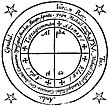
Back Towerkuns Afrikaans Ȝealdor/ᚷᛖᚪᛚᛞᚩᚱ ANG سحر (خارق للطبيعة) Arabic ܚܪܫܘܬܐ ARC سحر ARZ Maxa AST Sehr Azerbaijani Magėjė BAT-SMG Магія Byelorussian Магия Bulgarian

| Part of a series on |
| Magic |
|---|
 |
| Part of a series on the |
| Paranormal |
|---|
| Part of a series on |
| Esotericism |
|---|
 |
Magic is an ancient practice rooted in rituals, spiritual divinations, and/or cultural lineage—with an intention to invoke, manipulate, or otherwise manifest supernatural forces, beings, or entities in the natural world.[1] It is a categorical yet often ambiguous term which has been used to refer to a wide variety of beliefs and practices, frequently considered separate from both religion and science.[2]
Connotations have varied from positive to negative at times throughout history.[3] Within Western culture, magic has been linked to ideas of the Other,[4] foreignness,[5] and primitivism;[6] indicating that it is "a powerful marker of cultural difference"[7] and likewise, a non-modern phenomenon.[8] During the late nineteenth and early twentieth centuries, Western intellectuals perceived the practice of magic to be a sign of a primitive mentality and also commonly attributed it to marginalised groups of people.[7]
Aleister Crowley (1875–1947), a British occultist, defined "magick" as "the Science and Art of causing Change to occur in conformity with Will",[9] adding a 'k' to distinguish ceremonial or ritual magic from stage magic.[10] In modern occultism and neopagan religions, many self-described magicians and witches regularly practice ritual magic.[11] This view has been incorporated into chaos magic and the new religious movements of Thelema and Wicca.
- ^ "magic | Etymology, origin and meaning of magic by etymonline". www.etymonline.com. Retrieved 2022-10-13.
- ^ Hutton 2017, p. x.
- ^ Bailey 2018, pp. 1–5.
- ^ Bogdan 2012, p. 2; Graham 2018, p. 255.
- ^ Bailey 2018, p. 89.
- ^ Davies 2012, p. 1.
- ^ a b Styers 2004, p. 14.
- ^ Styers 2004, p. 8.
- ^ Crowley (1997), Introduction to Part III.
- ^ Bogdan 2012, p. 12; Bailey 2018, pp. 22–23.
- ^ Berger & Ezzy 2007, p. 24.
© MMXXIII Rich X Search. We shall prevail. All rights reserved. Rich X Search